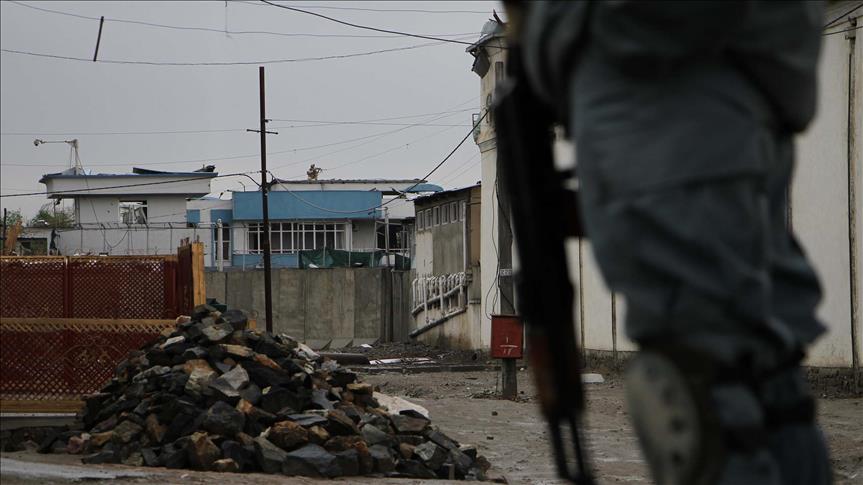Russia's backing Taliban demand triggers controversy
Moscow has acknowledged on a number of occasion having contacts with the Taliban in Afghanistan

KABUL, Afghanistan
Days before a planned conference on Afghanistan in Moscow, Russia’s top diplomat has stirred a new controversy in an already complex situation by echoing the Taliban’s demand for foreign forces’ exit from the war-riddled country.
In an interview with Bloomberg, Zamir Kabulov, Russian President Vladimir Putin’s special envoy for Afghanistan, said the Taliban’s longstanding demand for the exit of foreign forces from Afghanistan is ‘justified’.
The Russian envoy said none of Afghanistan’s neighbor is in support of the foreign military presence in Afghanistan.
He also accused Washington of ‘sabotaging’ Russian efforts to help end the Afghan war by boycotting a Moscow meeting planned for mid-April.
The Afghan Ministry of Foreign Affairs (MoFA) has declined to immediately comment on Kabulov’s remarks.
“It has now been made very clear that Russia, just like Pakistan and Iran, is against the presence of foreign, particularly American, troops in Afghanistan.
They claim to be supporting
Irshad stressed that the Afghan government should not back-track from all international and regional forums such as the planned conference in Moscow to present its case
She urged the government to convince the world that the raging violence in Afghanistan would not remain confined to the geographical limits of this country alone.
In February this year, Afghanistan marked the 28th anniversary of the Red Army’s withdrawal from the country. The former Soviet Union lost some 15,000 soldiers during a 10-year occupation of Afghanistan [1979 -1989].
The U.S. has so far lost 2,393 of its soldiers in Afghanistan since toppling the Taliban regime in 2001 with its ‘Operation Enduring Freedom’.
During the Soviet occupation of Afghanistan, the Americans were behind the then "rebels" -- the Mujahideen -- and now Moscow seems to be joining hands with the Taliban against the U.S.
The Russian officials, including Kabulov, have publicly acknowledged having "contacts" with the Taliban.
In January, the Taliban wrote an "open letter" to the U.S. President Donald Trump and warned they would not stop fighting unless all foreign forces are withdrawn from Afghanistan.
In a clear reference to the recent engagement with the Taliban by Russia, Iran, China and Pakistan,
"It is due to this reason that many countries regionally and globally have arrived at a conclusion that it is this nationally supported political-military power (Islamic Emirate) which they should interact and come to an understanding with as a responsible future entity of this country because the other groups and individuals have risen only through foreign support and do not have any foundations among the people," he wrote.
Recently, a Russian military delegation visited Pakistan’s restive tribal belt bordering Afghanistan, which has been seen as an apparent sign of converging geostrategic interests.
Pakistan for long has been considered as a close ally of the Taliban despite being a "frontline ally" of the U.S. against the so-called war on terror.
The Pakistan Army took a Russian military delegation – headed by Deputy Chief of General Staff Colonel General
This is the first time a Russian military delegation was flown to the region.
It is worth noticing the same tribal region between Pakistan and Afghanistan was the epicenter of U.S.-backed "Mujahideen", who were equipped and trained by Pakistan Army against the former Soviet Union in Afghanistan.
Brig. Mohammad Arif, a former Afghan National Army officer, told Anadolu Agency that the Moscow government has begun a new "gamble".
"Initially, when the Americans toppled the Taliban, the Russians were of the opinion that the U.S. should only leave the country after removing the threats of terrorism, but now their stance that the foreign troops should leave Afghanistan demonstrates they are confronting the American boots in Afghanistan openly," he said.
Arif said turning Afghanistan into a battleground for greater power could reverse all the gains in different areas the country has achieved in the relative peace recently.
The Trump administration is yet to announce its strategy on Afghanistan in regard to the number of boots on the ground.
Gen. John W. Nicholson, commander of the American-led international military force in Afghanistan, has urged Washington to deploy ‘a few thousand’ more troops in Afghanistan to overcome the “stalemate” in this conflict that has entered 16th year.
Currently, there are some 13,300 foreign troops stationed in Afghanistan, 8,400 of whom are American.
Anadolu Agency website contains only a portion of the news stories offered to subscribers in the AA News Broadcasting System (HAS), and in summarized form. Please contact us for subscription options.







